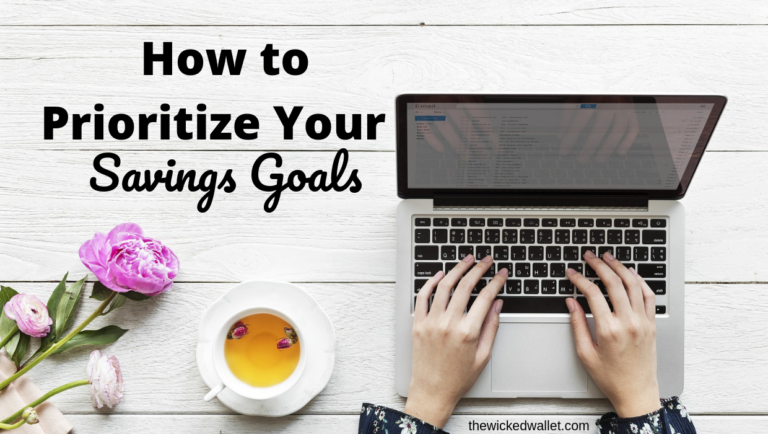Saving your money can be stressful. Understanding how to prioritize your savings can be confusing and present itself as a difficult task. When I first really started saving money back in high school, it was easy. Any money I hadn’t spent went directly into my savings account. I didn’t even think about retirement accounts, stock investments, emergency funds, real estate, or other potential investments. In fact, all the money that I was saving was only going towards more expensive material items that I wanted, like my 1981 Z28 Camaro. If only I knew what I know now…
How to Prioritize Your Savings
Emergency Fund
Your number 1 savings goal before putting money away towards any investments should be an emergency fund of at least three months worth of bare minimum living expenses. An emergency fund is exactly what it sounds like, it’s a fund that you only touch in case of emergencies. Say you suddenly lose your job and still need to pay your rent, and pay for all your other expenses. This fund will provide you with some cushion while you recover and find a new job. Another emergency may be a sickness or injury, medical bills aren’t cheap and can really set you back if your not prepared. Create an emergency fund and be prepared for the unforeseen.
As I mentioned above a great starting point is to save up 3 months worth of expenses. The more the better, but 3 months worth is a great goal to begin with.
Before Gina and I invested in real estate we both had prioritized our savings so that we each had a 6 month emergency fund on top of the money we had saved for the down payment on our property. Having this base of an emergency fund gave us more confidence to invest and took some pressure off of us.
Know Your Debt
Many people who have debt believe that the right thing to do is to pay off all your debt first before investing/saving your money. However the proper strategy is to pay off your debt in a way that allows you to invest/save the most.
Let’s say you have a two student loans with interest rates of 12% and 6%. The first thing you want to do is prioritize your debt and work on paying off the loans with the highest interest rates first. You want to do this because a higher interest rate equates to you paying more over time. So, in this scenario you want to work on paying off the 12% loan as fast as possible.
For the smaller loan you want to compare what you could be getting from other investments. For example the average return from the S&P is 9.7% that means that if you invested in the S&P rather then paying off your student debt you would make a return on investment (ROI) of 3.7% (9.7-6). Therefore, you would actually be better off paying the minimum on that loan and investing excess cash to grow your money faster.
Retirement Accounts
Now that you have saved up your emergency fund it should be time to start investing in your retirement account options.
(Click here to read my post, The 5 Most Important Retirement Accounts That You Need!)
Most corporate jobs offer a retirement account, the most common being the 401K. If you are not already aware you should check with your employer to see what they offer for retirement accounts. Many employers will even match your contributions up to a certain percent. Not to mention that by investing into a traditional 401K you are decreasing your taxable income which can potentially have a drastic effect on your annual taxes.
After building up our emergency funds, Gina and I have decided to prioritize our retirement accounts. Our goal is to first max out our employer 401K and then max out our Roth IRA accounts.
Other Investments
Saving for other investments should come last when prioritizing your savings. The primary reason that you should invest in retirement accounts first is because of the tax advantages that you don’t receive from the majority of other investments.
Some types of other investments include real estate, stocks, cryptocurrency, and business ventures.
There are a lot of benefits when it comes to real estate investing. For the most part it is fairly passive income, there are some tax breaks, and there is a chance for appreciation. A great way to cut out your living expense is to house hack. If you want to learn more about house hacking be sure to check out our house hacking series.
Stocks, cryptocurrency, and business ventures all pose their own risks but each can have significant upside. It’s very important to do your own research when investing, never invest in something just because someone else told you to do so.
Personal Desires
Last but certainly not least on your savings priority list should be things that you want but don’t necessarily need. This could be anything from going on that dream vacation, to buying a new tv, or getting that weekly mani/pedi. These savings goals although rewarding in the short term should be prioritized last as they do not benefit your financial health.
Closing Thoughts
It’s important to note that everyone is different and it’s okay to prioritize your goals to what suits you best. Some key takeaways from this post is to 1) Your top priority should be to create an emergency fund that can cover you for three months worth of expenses, 2) Understand your debt, 3) If your employer offers a 401K match then at the very minimum invest that percentage, 4)Understand what you are investing in, and 5) Put your personal wants at the bottom of your savings goals.
If you want to be in control of your finances you need to have discipline and you need to understand what is really important to you.



